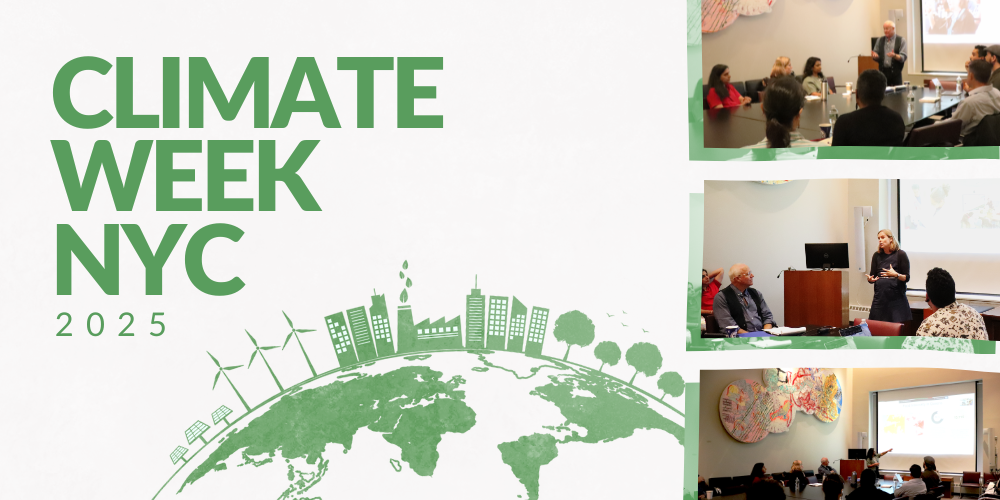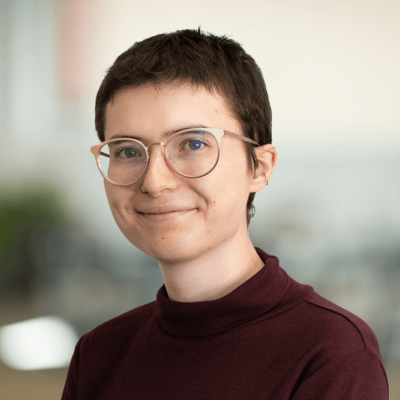Community colleges have long been at the forefront of workforce education, but the critical role they play in responding to climate change has often been overlooked.
At a Climate Week NYC panel discussion titled Community Colleges and Climate Futures, held at the City University of New York (CUNY) Graduate Center in Manhattan, speakers from community colleges and environmental groups explored how community college program offerings are essential to transforming the future of our infrastructure, energy, and agricultural systems.
“Community colleges can serve as resilience hubs to help our communities prepare for what’s coming,” said Bret Eynon, host of the event, a former professor and associate provost at LaGuardia Community College who has worked with CCRC on the Climate Futures webinar series.
Professors from four CUNY campuses (LaGuardia, Kingsborough, and Borough of Manhattan community colleges, and Baruch College) and representatives from the Hudson River Park Trust talked about diverse programs that offer students meaningful pathways to high-value, climate-related careers, from tracking the accuracy of weather forecasts in Puerto Rico in the aftermath of Hurricane Maria to research programs at a 400-acre estuarine sanctuary.
One climate-focused urban agriculture program at LaGuardia, Finca La Florecita, offers students experience working on an urban farm while supplying the on-campus food pantry with fresh, organic produce direct from the garden. The food pantry at LaGuardia is the third most visited place on campus, and before the inception of the program, only had canned food. Now, students working on the farm provide free fresh groceries to lines of waiting students. Professor Preethi Radhakrishnan, director of the college’s Environmental Science Program, who runs Finca La Florecita, explained the connections between food insecurity, workforce training, and land stewardship, and described how CUNY’s first associate degree in sustainable urban agriculture is one of the fastest growing programs on campus.
“You might ask me, ‘Are there students in the city who are interested in agriculture?’” Radhakrishnan said. “The answer is yes, because many of our immigrant students come from these amazing backgrounds of their parents being farmers.”
Kingsborough offers several free workforce development programs to students, including Bridges to Offshore Wind, a seminar educating students on careers in the local offshore wind industry and connecting them to resources to access relevant programs, like the Maritime Technology Apprenticeship Program (MTAP). MTAP provides hands-on, paid apprenticeship work under a skilled mentor in the field. Students graduate in four years with an AAS in Maritime Technology and the title of journeyman from the NYS Department of Labor. The Energy and Carbon Management Program provides hands-on lab experience to implement new energy technology in buildings and pays students $20/hour for their class and homework time. Robert Zandi, associate director of renewable energy programs, aims to educate disadvantaged communities in New York about how addressing environmental justice can also present meaningful career opportunities.
“There’s a wide variety of jobs that can be had in the green, renewable, sustainable technology industry when it comes to welding, manufacturing, fabricating,” Zandi said, “but an important part to note is that a lot of our trainings are also providing crosstransferable skills,” so that when new needs emerge, students will be ready to meet them.
While immediate entry into the workforce is vital for many community college students, others aspire to transfer and earn advanced degrees. The CUNY Climate Scholars’ program, led by Baruch Professor Chester Zarnoch, provides paid research fellowships to community college students, helping them to partner with CUNY faculty and climate-focused community groups. BMCC Professor Lalitha Jayant described the research her students are doing with Hudson River estuary sea urchins, which are highly vulnerable to pollution and climate change, supporting students’ growth as climate scientists focused on sensitive urban environments. Professor Ryan Mann-Hamilton, meanwhile, engages LaGuardia students in research on documenting the impact of climate change on Puerto Rican agricultural workers, developing education campaigns to protect parrotfish, a keystone species essential to the survival of the Caribbean coral reefs, and tracking air quality, both in New York City and across Puerto Rico.
“We know that disadvantaged communities here in New York City and elsewhere are going to be the most impacted by climate change,” Zarnoch said. “These students need to be leaders in their communities. They need to be able to answer questions from community members, be able to stand up and support their community, and we need to enable them and empower them to be able to do that.”
The event, co-sponsored by The Center for the Humanities at the CUNY Graduate Center, LaGuardia’s Casa de las Américas, the Center for Climate Futures at the Foundation for California Community Colleges, and CCRC, closed with a discussion on how to strengthen this work across CUNY campuses and the nation. Though federal investment in climate work may have waned, state support is strong, and these programs remain essential for local economies and infrastructure. Community colleges are often rooted in communities that are most vulnerable to climate disasters, Eynon said, and community college students are essential partners in responding to and planning for our climate future.





